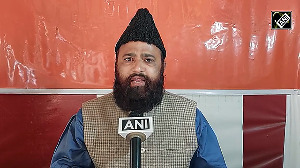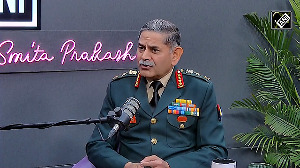Maulana Sufi Mohammad, the septuagenarian chief of the outlawed Tehrik-e-Nifaz-e Shariah Mohammedi, and some 300 followers marched through Mingora, the main city of Swat district in the North West Frontier Province.
The TNSM activists were joined by the residents of Mingora, who have been yearning for peace after violence by local Taliban militants over the past few months.
Mohammad is expected to set up a peace camp in Matta sub-district, considered a stronghold of the Taliban on a mission which media reports said was to "salvage the seemingly irredeemable situation in Swat".
"The job assigned to Mohammad is considered by many analysts to be too difficult, if not downright impossible and his mission is not only fraught with danger but is also entirely unpredictable," The Dawn newspaper said.
Mohammad and his supporters, carrying black and white flags representing the Taliban and peace, marched through Mingora as hundreds of residents shouted "We want peace!".
Later, Mohammad told media persons that he plans to open dialogue with the Taliban soon. "We plan to ask them to lay down their arms. We are hopeful they will not let us down," Mohammad was quoted as saying by television channels.
On Monday, the NWFP government and the TNSM signed an agreement that envisages the enforcement of Islamic law in the Malakand division, which includes the Swat valley.
Britain, North Atlantic Treaty Organisation, India and other countries have expressed concern over the deal but the Pakistan government has said it has made no concessions to the militants.
The TNSM chief plans to soon hold talks with Maulana Fazlullah, the Taliban commander in Swat who is also his son-in-law. The Taliban have called a unilateral 10-day ceasefire in Swat and said the truce could be made permanent if the parleys are successful.
However, observers and security experts have expressed apprehensions that the Taliban might use the lull to re-group. They have also said the deal to enforce Sharia or Islamic law in Swat could embolden militants in other parts of Pakistan to raise similar demands.
The secular Awami National Party government in NWFP has sought to back the deal by saying that Islamic laws had for long been in force in Swat, which was a princely state before it joined Pakistan in 1969.
Bashir Ahmed Bilour, a top ANP leader and senior minister in the NWFP government, said the deal was aimed at ensuring "speedy justice" and should not be seen as merely an effort to enforce Sharia.






 © 2025
© 2025